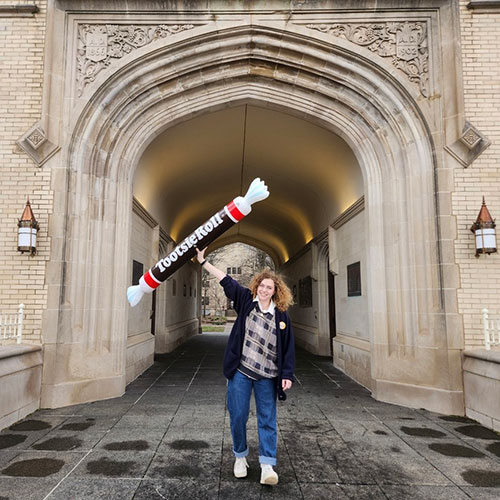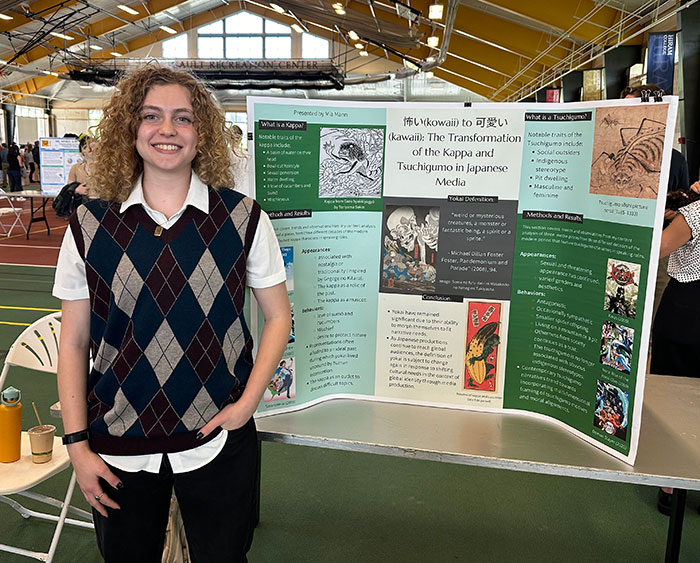
Research into Japanese folklore evolution gratifying for student-designed major

Mia Mann ’24 came to The College of Wooster with an interest in multiple majors; anthropology, East Asian studies, and history all appealed to her. Working with faculty advisors, she developed a student-designed major in anthropology and East Asian history, and for her Independent Study project, she brought all her ideas together in a way that allowed her to study visual media in Japanese folklore, a topic that always interested her.
“Actually having the time, resources, and energy to focus on such a massive research project and having it all turnout was really satisfying and gratifying as well,” Mann said.
Working with mentors Margaret Ng Wee-Siang, associate professor of history and chair of East Asian studies, and Michael Miyawaki, assistant professor of sociology and anthropology, Mann studied media from the Edo period (1603-1868) to contemporary Japanese literature. She looked at the historical evolution of yokai spirits including a kappa or froglike creature, and the tsuchigumo, a spiderlike demon, and their representations in visual media from woodblock prints to contemporary manga comics and anime.
“They always fit to shape the narrative needs of the producers and consumers in the social and cultural context,” she explained. “As cultural society continues to progress, global audiences have become more interested in Japanese media, and the narrative context and definition of these yokai will continue to shift to accommodate the growing needs of different audiences.”
What inspired you to choose this topic for your I.S.?
Mann: I’ve always been really interested in folklore, but specifically I was interested in Japanese folklore because it had a different societal progress from other folklore that I’d looked at. When I studied abroad in Japan, I noticed a lot of these characters kept popping up. I thought it would be interesting to look at how their context in society has changed over time because I knew the yokai have had such a dramatic shift.
What did it mean to you to be able to choose your own research project and design it based on your interests?
Mann: I love doing research, and being able to put the puzzle pieces together is such a satisfying experience overall because I knew that I had these questions and interests in learning more. Being given the time, resources, and energy to focus on such a massive research project and having it all turnout was really satisfying and gratifying as well.
How has your relationship with your I.S. mentor supported you throughout this process?
Mann: Dr. Ng and Dr. Miyawaki were intrinsic to the construction and execution of my thesis, as well as my personal growth in academia. Beginning with the task of narrowing down my I.S. topic, and ending with the final round of edits, my advisors’ insights were the guiding force for me. I deeply value the knowledge, insight, and time that my advisors dedicated to me. Their help and patience have shaped me for the better in terms of my writing, critical thinking, and my approach to the world and my career.
What has I.S. taught you?
Mann: Completing I.S. and participating in the symposium presentations proved to me that I could plan, structure, and complete a project of this magnitude and expectation. My college career has not only proven to me my own intellectual capacity but has also expanded my worldview and capacity for critical thinking exponentially.

Mann presented her Independent Study to the College community at the Senior Research Symposium.
After completing her degree, Mann is excited to work in her community as guest services associate at the Clifton Cultural Arts Center in Cincinnati.
Posted in Independent Study on June 17, 2024.
Related Posts
Related Areas of Study
History
Critically examine events and societies of the past and learn to tell the stories future generations need to know
Major MinorEast Asian Studies
A multidisciplinary approach to studying the diverse but related historical and cultural traditions of East Asia
Major MinorAnthropology
Use problem-solving and research skills to explore and understand communities and cultures in every part of the world.
Major Minor

